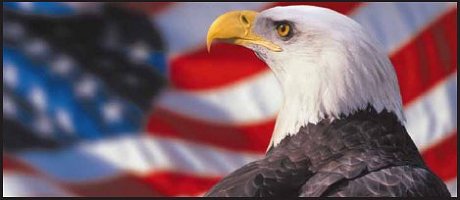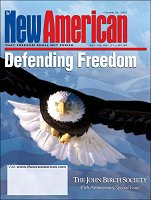
|
|
|
|
Back to Basics
Our Founding Fathers gave us a Constitutional Republic. Because of them, we were born free. Nevertheless, we could die slaves because we have lost sight of basic truths.
1. Freedom cannot exist without morality. The phrase immoral free men makes no more sense than dry water. Unless we have sufficient character and moral fortitude, we will not be able to govern ourselves.
When morality declines, the abuse of rights increases and more government is necessary. Just as criminals need jailers and domesticated animals need herdsmen, an immoral citizenry needs a police state. If we ever abandon our morality and adopt instead the law of the jungle, we will lose our freedom.
2. Ignorant and free can never be. In order to be capable of self-government, we must not only be moral but informed. If we are not informed, we will tend to vote for the politician who promises the most. We will vote for more and bigger government until one day we have total government.
An uninformed electorate, whether moral or immoral, will vote itself into slavery. Only a moral, well-informed electorate will vote for men of principle - who will limit government to its proper role.
3. Our rights come from God. When God created man, He gave him certain inalienable rights. Because rights existed prior to men joining together to form governments, the purpose of government is only to protect these rights. It cannot be to grant us rights that we already have. Nor can it be to legislate out of existence rights that are inalienable.
Our form of government is based on this fundamental truth. If we ever abandon it, we will lose our form of government.
4. The essence of freedom is the limitation of government. Because men are not angels, some government is necessary to secure our God-given rights. Because government officials are men, the powers of government must be strictly limited and constantly held in check.
The U.S. Constitution limits the powers of the Federal Government. Nonetheless, much that the Federal Government does today is unconstitutional. We have allowed this abuse of authority to occur because we have forgotten basic truths. We will preserve our freedom for future generations only if we recall the wisdom of our fathers and get back to basics!
A Government of Laws - or of Men?
Because men created governments (and not vice versa), the rights of government are based on the God-given rights of the individual. An individual has the right to defend his life, liberty, and property; therefore, he also has the right to join with others and form a government to protect his rights. An individual does not have the right to violate the rights of another, and neither does government.
Government should be large enough to secure our God-given rights but not large enough to violate these rights. Anyone who understands this comprehends the proper role of government.
If there were no government whatsoever, our rights would not be secure. Individuals acting alone would be unable to protect their liberty against the criminal acts of unjust men. In the absence of any organized government, anarchy would prevail. Ultimately, the criminals would take control and enslave their fellow citizens.
Our rights also would not be secure under a system of total governmental control. Such a government might grant its citizens privileges from time to time, but it could also take away those privileges on a whim. Whenever government has total power, individuals have none. Remember, the root of the word totalitarian is total!
Communism and Nazism are not at opposite ends of the political spectrum as the public has been led to believe. They are ideological twins! Both are totalitarian, and both are examples of 100 percent governmental control.
Our rights can only be secure under limited government. Liberty is a way station between anarchy (no government) on one end of the political spectrum and totalitarianism (total government) on the other end.
Preserving liberty for ourselves and future generations is no easy task. As George Washington warned, "Government is not reason; it is not eloquence; it is force! Like fire, it is a dangerous servant and a fearful master." Because our Founding Fathers realized that government, like fire, had to be contained, they gave us a government of laws and not of men. They created a republic and not a democracy.
A democracy is majority rule and is destructive of liberty because there is no law to prevent the majority from trampling on individual rights. Whatever the majority says goes! A lynch mob is an example of pure democracy in action. There is only one dissenting vote, and that is cast by the person at the end of the rope.
A republic is a government of law under a Constitution. The Constitution holds the government in check and prevents the majority (acting through their government) from violating the rights of the individual. Under this system of government a lynch mob is illegal. The suspected criminal cannot be denied his right to a fair trial even if a majority of the citzenry demands otherwise.
We will either be governed by laws or ruled by men. Because of man's nature, rule by men has always ended in tyranny. Only under a government of laws will our God-given rights be secure.
Have You Been Deceived?
QUESTION: When the Founding Fathers established our government, they gave us: (a) a democracy, or (b) a republic?
The question is basic, and the correct answer should be known to every schoolchild. Nevertheless, if you have been led to believe that our country is a democracy, you have been deceived.
Not only did our Founding Fathers establish a republic, they greatly feared democracy. James Madison, known as the father of the U.S. Constitution, wrote in "Essay #10" of The Federalist Papers: "... democracies have ever been spectacles of turbulence and contention; have ever been found incompatible with personal security or the rights of property; and have in general been as short in their lives as they have been violent in their deaths."
Although such an attitude will surprise most Americans, it is accurate.
The United States Constitution does not contain the word democracy. It does "guarantee to every State in this Union a republican form of government...." Also, when we recite the Pledge of Allegiance to the flag, we say, "to the Republic for which it stands," and not "to the Democracy."
The difference between a republic and a democracy was once widely understood in America. The U.S. War Department (superseded by the Department of Defense) taught that difference in a training manual (No. 2000-25) published on November 30, 1928. This official U.S. government document, used at the time for the training of American military personnel, said of democracy:
"A government of the masses.
Authority derived through mass meeting or any other form of 'direct' expression.
Results in mobocracy.
Attitude toward property is communistic - negating property rights.
Attitude toward law is that the will of the majority shall regulate, whether it be based upon deliberation or governed by passion, prejudice, and impulse, without restraint or regard to consequences.
Results in demogogism, license, agitation, discontent, anarchy."
It went on to state: "Our Constitutional fathers, familiar with the strength and weakness of both autocracy and democracy, with fixed principles definitely in mind, defined a representative republican form of government. They 'made a very marked distinction between a republic and a democracy . . . and said repeatedly and emphatically that they had founded a republic.'"
If you have been misled as to the type of government we inherited, you should ask why.
Is It Constitutional ?
The United States of America is a Constitutional Republic consisting of the Federal Government and the state governments. It is not a Democracy. The Federal Government operates under the specific powers delegated to it by the United States Constitution, while each of the state governments operates under a state constitution.
The U.S. Congress is not authorized to make any law it chooses; it is bound by this Constitutional mandate. For instance, the First Amendment states, "Congress shall make no law respecting an establishment of religion, or prohibiting the free exercise thereof; or abridging the freedom of speech or of the press; or the right of the people peaceably to assemble, and to petition the Government for a redress of grievances." And the Tenth Amendment states, "The powers not delegated to the United States by the Constitution, nor prohibited by it to the States, are reserved to the States respectively, or to the people."
The Constitution authorizes the Federal Government to protect our God-given rights and to provide for the common defense. It does not authorize Fedgov to provide foreign aid handouts, unemployment benefits, subsidized housing units, food stamps, agricultural price supports, or other share-the-wealth schemes.
Tragically, much of the legislation that Congress passes is unconstitutional. This abuse of authority has occurred because we have lost sight of basic principles.
Your Congressman has taken an oath to uphold the Constitution. Whenever a new bill comes up for a vote, he should ask himself: Is it Constitutional? If it is unconstitutional, he should vote against it. If he does not vote against unconstitutional legislation, you should ask him why.
